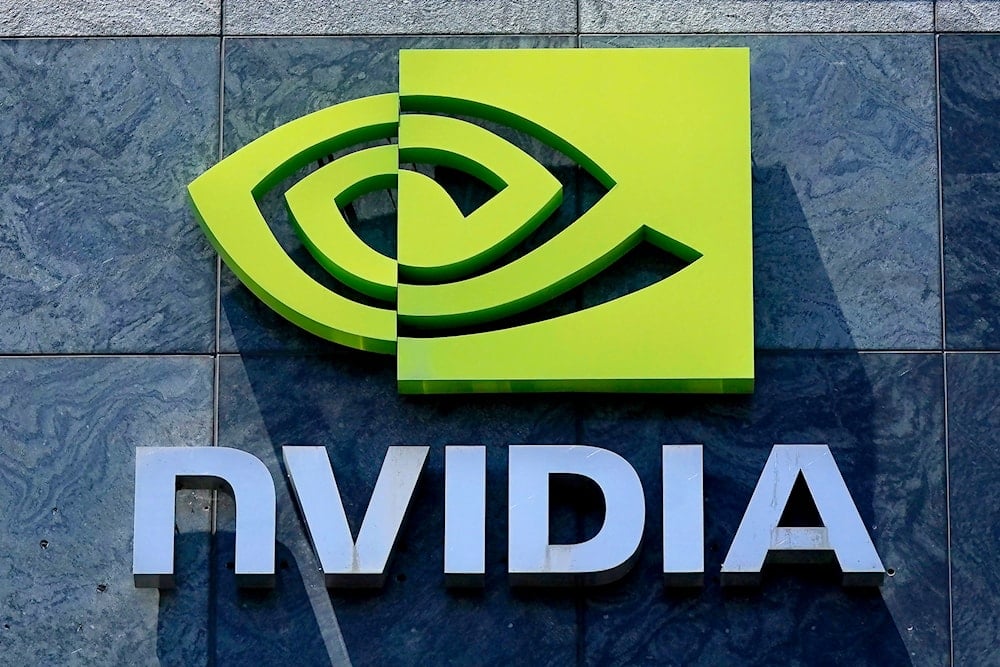Trump bars Nvidia's top AI chips from China
US President Donald Trump says Nvidia's cutting-edge Blackwell AI chips will be reserved exclusively for US companies, barring China and other countries from access.
-

A sign for a Nvidia building is shown in Santa Clara, Calif., on May 31, 2023. (AP Photo/Jeff Chiu, File)
US President Donald Trump has stated that Nvidia's most advanced Blackwell AI chips will be reserved solely for US companies, signaling a firm stance on restricting access to cutting-edge AI technology. During a taped interview aired on CBS' "60 Minutes" and in comments aboard Air Force One, Trump emphasized that only the United States should benefit from these top-tier semiconductors.
"The most advanced, we will not let anybody have them other than the United States," Trump told CBS.
Reiterating the point while speaking to reporters during his return from Florida, he added, “We don't give (the Blackwell) chip to other people.”
Trump’s remarks suggest that his administration could impose stricter controls on the export of advanced American AI chips than previously indicated. The policy would bar China, and potentially other countries, from acquiring Nvidia’s most sophisticated Blackwell chips, a move framed as essential to maintaining the US lead in artificial intelligence.
Since August, there have been ongoing questions about whether scaled-down versions of the Blackwell chips might be approved for sale to Chinese companies. While Trump clarified that the most advanced models would remain off-limits to China, he did not entirely rule out selling less capable variants.
"We will let them deal with Nvidia but not in terms of the most advanced," he told "60 Minutes."
Nvidia’s global sales and South Korea deal
Amid Trump's firm stance on limiting exports to China, Nvidia recently announced it would supply more than 260,000 Blackwell AI chips to South Korea. The deal includes deliveries to major South Korean companies, such as Samsung Electronics, marking a significant international sale of the Blackwell series.
The development aligns with the Trump administration’s July AI blueprint, which seeks to expand AI collaboration with allies while enforcing tighter restrictions on countries like China.
The possibility of selling a limited-performance version of the Blackwell chip to Chinese firms has drawn mixed reactions. While Trump left open the option for such a sale, the idea has sparked concern among China hawks in Washington.
Republican Congressman John Moolenaar, who chairs the House Select Committee on China, criticized such a move, saying it "would be akin (to) giving Iran weapons-grade uranium." Although Trump previously hinted he might address the chip issue with Chinese President Xi Jinping during a summit in South Korea, he later confirmed the topic was not discussed.
Political reactions and strategic implications
Trump's comments reflect growing bipartisan pressure in Washington to curb China's access to high-performance computing technology, and critics argue that even limited AI chip exports could strengthen China’s capabilities in key areas.
The debate reflects broader concerns over technology transfer and the role of semiconductor innovation in global power dynamics.
Nvidia CEO Jensen Huang recently commented on the company's status in the Chinese market. Speaking at a developers' event, Huang noted that Nvidia has not sought US export licenses to ship to China due to Beijing’s current stance.
"They've made it very clear that they don't want Nvidia to be there right now," Huang said, adding that access to the Chinese market is vital for funding research and development efforts in the United States. The US government's export policy on Nvidia chips continues to evolve amid shifting geopolitical calculations and rising global demand for AI hardware.

 4 Min Read
4 Min Read








